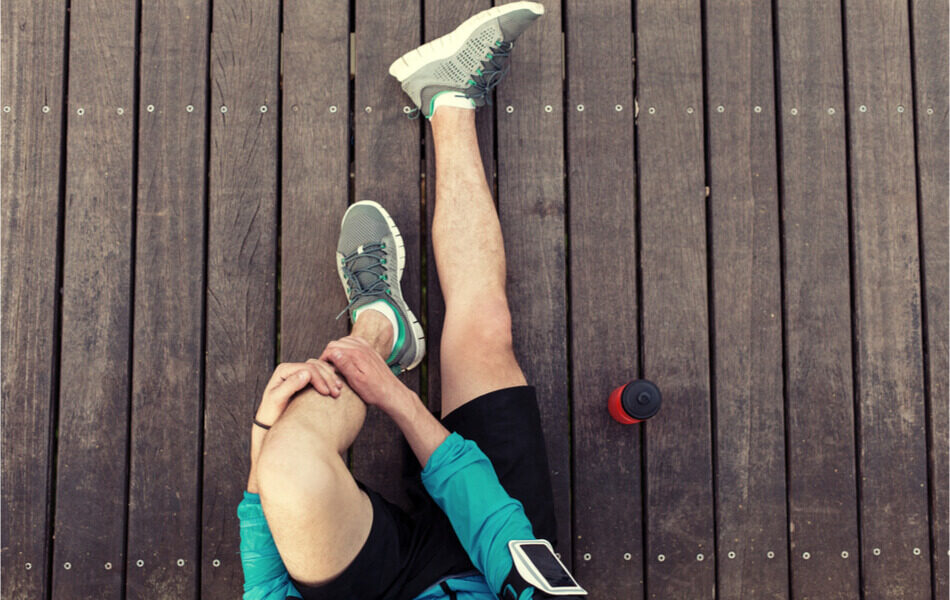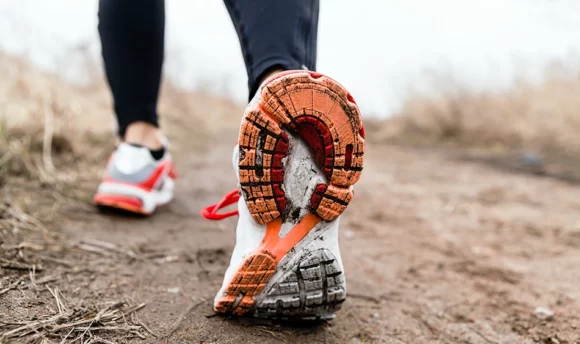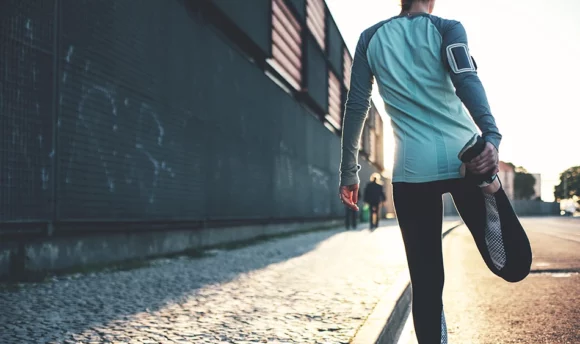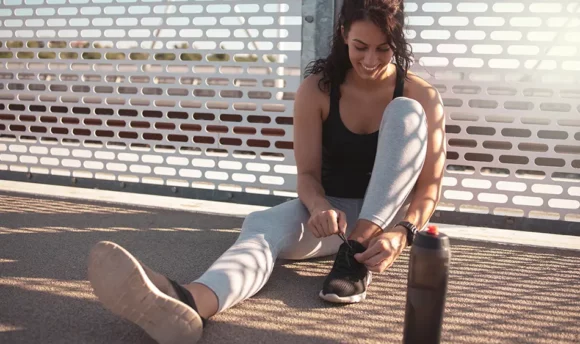Do You Feel Heaviness in Your Legs? Here Are 5 Tips on How to Prevent It

Feeling heaviness in your legs is completely normal, and there are a lot of variables that can cause this tired feeling.
Have you ever gone on a run where you were convinced your shoes suddenly turned to lead? Every step you take feels like there are weights on the bottom of your feet, and it’s a struggle to place one foot in front of the other.
If you’ve ever experienced one of these runs, chances are you were left wondering why.
It’s important to pay attention to the complexity of the body. Things like small changes in your eating or sleeping habits can have big effects on your muscles and performance.
In this article, we will be reviewing the different factors that contribute to your legs feeling tired and heavy as you run.
What Are Heavy Legs?
The best way to describe the sensation of heavy legs is that it feels like you’re carrying weights around your ankles or trying to walk through water.
Other symptoms of heavy legs are:
- Swelling of the legs
- Numb feeling in your legs
- Aching or throbbing
- A tingling sensation
- Tired and stiff feeling
- Difficulty sitting or standing for long periods of time
- Restless leg syndrome
Why Do My Legs Feel Heavy When I Run?
There are several reasons why you could be experiencing heavy legs when running, including a lack of carbohydrates, dehydration, poor circulation, and muscle fatigue.
What Can Cause Heavy Legs? Running-Related Causes
Heavy legs are often the symptom of poor physical health. Things like living a sedentary life and being overweight can lead to heavy legs because of poor blood circulation to your legs.
If you are not currently overweight but have been using running as your main form of exercise, this could also cause heaviness in the legs. This happens for a few reasons, which we will be reviewing below.
Lack of stretching before and after a run
As with most things in life, proper preparation beforehand is important. Not stretching before your run reduces the mobility of your muscles and joints. Tight muscles can negatively affect your running form, and as we’ll talk about later in this article, proper form can help prevent heavy legs when running.
If you’re not sure where to start with pre or post-workout stretches, download an app specifically for running. Joggo not only offers a personalized training plan to its users but also includes things like warm-up stretches and cool-down exercises.

- Personalized running plans created by professional coaches
- Meal plans perfectly tailored to your current diet, allergies, and health needs
- Treadmill mode for people preferring indoor running
- Educational articles on easier running, injury prevention, nutrition, and more
- Behavior science-based reward system for lasting motivation
Overtraining
Running more miles than your body can handle can lead to a heavy feeling in your legs. This is because your muscles haven’t had a chance to fully recover since your last workout.
If you are experiencing heavy legs frequently during your workouts, it could be an indication that you need to take more rest days.
Taking proper rest in between your workouts or reducing your mileage can prevent not only muscle soreness but also your chance of injury.
Lack of sleep
Another key component of giving your body the chance to fully recover in between workouts is proper sleep. When you sleep and you enter your REM cycle, your body releases growth hormones that contribute to the preparation and growth of your muscles.
Getting just a few hours of sleep every night won’t cut it if you’re training hard. You should aim for at least 7 hours but ideally between 7–9 hours of sleep every night to keep your muscles happy and healthy.
Not enough carbs
When you eat carbohydrates, your body converts them to glycogen, the body’s form of glucose. This glucose is the main source of energy for your muscles.
Not enough glycogen in the body means you don’t have a source of energy for your muscles to use. Eating carbs before your workout helps prepare your body with the energy it needs. Having a high-carb meal afterward aids in muscle growth and repair.
Poor running form
Poor running form can lead to a host of problems, including muscle imbalances like hip flexor tightness and IT band issues. Along with muscular issues, poor form leads to inefficient muscle use, meaning you will feel fatigued more quickly.
If you are overexerting the muscles in your legs due to poor running form, it could lead to tired and heavy legs. This is simply because your muscles are burning through energy too quickly, supporting unnecessary movements.
Wearing the wrong running shoes
The kind of footwear you choose might seem insignificant, but wearing the wrong shoes can also contribute to your legs feeling heavy when you run.
You should always choose shoes that are lightweight but still offer full support. Choosing shoes that will reduce the amount of stress that your legs and feet experience while still feeling light should be the goal.
Health-Related Diseases
As mentioned before, heavy leg syndrome can also be affected by health-related diseases. Now we will be covering some of the non-running-related issues that could be attributed to your heavy legs.
Varicose veins
Varicose veins are swollen and enlarged veins that usually appear to be blue or dark purple. They are caused by weak vein valves. Weak valves lead to a lack of flow of blood through the veins and stretching of the vein walls. As the walls stretch, blood can begin to pool, leaving legs feeling heavy, achy, and fatigued.
Chronic venous insufficiency
Chronic venous insufficiency often leads to varicose veins. In your veins, you have small valves, which allow blood to flow to the heart but not away from it. As you tense your muscles, the increased pressure on your veins pushes blood toward your heart, and the valves keep it from flowing backward.
If the valves in your veins are weakened, it can lead to a pooling of blood in your veins. This pooling can cause swelling in the ankles and legs, along with other symptoms that result in heavy and tired legs.
Restless leg syndrome (RLS)
Restless leg syndrome is described as an uncontrollable urge to move the legs. It usually occurs in the late hours of the day, such as when you’re in bed. The need to move your legs is caused by a desire to alleviate discomfort, and movement of the legs generally alleviates the discomfort, at least momentarily.
Although the cause of RLS isn’t completely known, it is thought to be a side-effect of iron deficiency. Eating iron-rich foods can help you alleviate restlessness in the legs and maintain high levels of oxygenation in your red blood cells.
Peripheral arterial disease (PAD)
Peripheral arterial disease is a condition that can lead to numbness and weakness as well as muscle atrophy in the legs. If it goes untreated, it can lead to mild to severe muscle aches when walking that usually subside when sitting.
PAD is caused by a narrowing of arteries which restricts blood flow to the limbs. Generally, this narrowing is due to the buildup of fatty deposits in the arteries.
5 Tips to Prevent Heaviness While Running
There are tips and tricks you can use to prevent heavy legs when running. In this section, we will be covering some of the lifestyle changes you can make to prevent your legs from fatiguing.
#1 Elevating legs
Elevating your legs can help relieve the feeling of heavy legs. It improves blood circulation and can aid weakened veins in pumping deoxygenated blood back to the heart.
Leg elevation helps relieve the symptoms of varicose veins and decrease swelling in the legs. Improved blood flow and reduction in swelling of your legs help you recover more quickly after vigorous exercise and can prevent the feeling of tired and heavy legs.
#2 Staying hydrated
Dehydration can lead to a depletion of minerals like calcium, potassium, and magnesium. These minerals are essential for muscle function.
This means that when you are dehydrated, your muscles can cramp, contributing to that heavy leg feeling. As with any exercise, make sure you are getting the proper amount of water per day for your body.
#3 Stretching before and after a run
As we mentioned earlier in this article, stretching before and after your run can help reduce the feeling of heavy legs when running.
This is because stretching before your runs allows your muscles to be loose and limber and aids in your ability to use the correct running form.
Taking time to stretch after your run is also helpful because it reduces lactic acid buildup in your muscles. Meaning less recovery time and healthier muscles in the long run.
#4 Improving running posture
Improving your posture is one of the best ways for you to run more efficiently, which can decrease the feeling of heaviness in your legs.
If you want to improve your running form, you should focus on your running stride. Make sure your knee flexes right over the top of your ankle as your foot makes contact with the ground. To make this change happen, you can try increasing your running cadence, also known as the number of steps you take per minute.
Beyond that, ensure that you are keeping your shoulders upright and relaxed as you run.
#5 Avoiding wearing tight clothing
It can be difficult to figure out what to wear when running, especially when the weather turns cold.
Wearing clothing that is too tight for you, leaves red marks on your skin, or limits your mobility is uncomfortable and reduces blood circulation.
As you’ve probably picked up throughout this article, poor circulation is one of the leading causes of heavy legs when running.
You should be choosing clothing that allows for proper blood flow and feels comfortable for you to work out in. If you need more help figuring out what to wear running in the cold, be sure to check out this article for more tips.
FAQs
You might have noticed runners hitting their legs before a race. They do this to increase blood flow in their leg muscles. It is also believed to help reduce lactic acid buildup.
Standing can feel harder than running for a couple of reasons. Muscles, like your hip flexors, are actually in their tensed state when you are standing, which can lead them to feel fatigued over time.
Tensing the muscles in your legs is also what allows blood to flow through your veins. When you stand for too long without moving your leg muscles, it can lead your blood to pool in your lower legs.
A key to reducing tiredness in your legs is to simply prepare properly before your runs. Make sure you are hydrated, well-slept, and have eaten nutritious food beforehand.
If you are still fatigued while running, you can try slowing your pace. Let your body dictate the pace if you are feeling fatigued; it always knows best.
Your legs could be feeling tight for a number of reasons. Your muscles could be seizing up as you run due to dehydration and a lack of magnesium. You could also be experiencing DOMS after a previous workout that you haven’t fully recovered from.
A Word From Our Coach
Feeling sluggish or worn out during your workout is okay every once in a while, but if it’s turning into a daily routine, then it’s time to switch things up.
If your lack of motivation is caused by the fact that you’re not much of a runner, check out this article about how to start running when you hate it.
If not, there are many different factors that could be contributing to your heavy legs. Pay attention to the sign that your body is giving you through your tiredness, and you could potentially make some lifestyle changes for the better.
As always, your goal for working out should be to feel good. If your body is craving rest or better nutrition, love yourself enough to slow down and move toward living a healthier, happier life.
Key Takeaways
Your heavy legs could be caused by things like dehydration, lack of sleep, not enough iron in your diet, and other factors.
Regardless of what is causing your legs to feel fatigued, it is a clear sign from your body that something needs to change.
Try implementing some of the lifestyle and workout tips from this article into your daily routine to see if you notice a difference. Your body will thank you, and your runs will be better than ever.

















































 Select your language:
Select your language: 








